Listening as a Framework
[Listening as what sets the conditions for speech / Listening as what brings attention to the already always present/changing frameworks and conditions / Listening as a framework for discovering (pre-)conditions / What frames listening, and what does listening frame? / Listening as a framework for not-yetness / … / Listening as a framework for extending the familiar, the known, assumed / What is non- or un-framed listening? ]
Invitation:
Invite yourself to breathe and simply be with your body.
If possible, do it together with someone, or find a safe space for yourself.
Engage with the consequences of your breathing and being a body.
Allow the vibrations, pains, reliefs, imaginations etc. to manifest themself – if need be, only shortly.
If possible, give yourself time and care to stay with your breathing, with your body.
Listen to it.
– attempt to breath to the very edge of your being.
– breathe until your orientation is shifting.
We propose to think with the ways of engaging with and practice listening as a framework – as a critical, empathic, and artistic framework.
We propose to formulate listening as a framework of re-orientation.
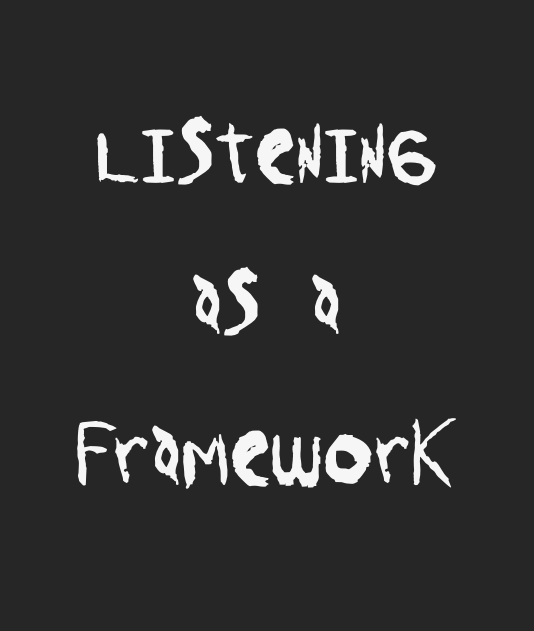
The typefont used is called 'Mother Nature is a Lesbian'. It is created by Be Oakly at Genderfail, and is based on a protest sign. It is open source and used here after economic donation to Genderfail Press.
As a framework:
When considering listening as a framework, we seek to draw attention to, engage with, and propose listening as turning of gaze; as a slow methodology and an art of noticing; mode of capturing information; as a creative, speculative, and imagination driving proposition; as a political, activistic strategy for soft resistance; as a nurturing and caring for the limits of the body, and struggles of the body; as bringing attention to the said as well as the unsaid; as a way of holding space, relations, and dreams; as a bridges building capacity between the known and unknown, the spoken and unspoken, the withdrawn, not-yet shared, and the unreachable; as a gentle gesture supporting processes of reflection, creativity, community building and empathy; as an practice of healing and repairing our individual, shared, ecological, planetarian relationships; as an embodied power for open-ended assemblies; – and listening as a way of being, of living, together.
[An incomplete ‘listing’, shaped by the already always limited position of one’s orientation.]
Invitation:
In your own time, and by your own way, consider what framework of listening you have been practicing…
Rate your own listening on a scale from 1-10
How do you think other people would rate your listening on a scale from 1-10?
[Meant as a joke…]
What means of consideration, of judgment and understanding, do we have to ‘frame’/’scale’/’engage’/’know’ the listening practice of oneself and others?
A few possible relevant quotes:
“Is listening something of which philosophy is capable […] hasn’t philosophy superimposed upon listening, beforehand and of necessity, or else substituted for listening, something else that might be more on the order of understanding?”
(Jean-Luc Nancy, Listening pp. 1, 2007)
“Listening opens an important view onto understandings of agency by underscoring the political not as a drama of appearance and outspokenness alone, but rather, listening also reminds how recognition is affected by that sense of being heard, as well as the necessity to hear something differing, where listening may also strike back, in terms of mobilizing people in their desire to reconfigure the flows of power, to demand a different form of life. While emphasis is often placed on the one who speaks, on the staging of the political voice, I’m interested equally to turn attention to the one who listens – the listener as an actant, and one that lends an important force. For listening also draws us toward states of critical reflection, slowness, shared attunement, and capacities for understanding or care, all of which articulate other dimensions of power.”
“As a gesture, as an act, listening works at figuring scenes of support, enabling a process of collaboration that often extends beyond the apparent and the articulated. As such, it lends to the ongoing demands and challenges of responsiveness, to bring energy to states of attention which as Masschelein poses, open important “spaces of self-transformation.” Attention is a nurturing act, providing that basis for learning, knowing, and understanding. In this sense, it works at extending oneself: toward other knowledges, other viewpoints, other ways of living. I give my attention, in fact, makes possible. Attentiveness is therefore a critical and creative position, a stance one also takes in order to engage the collaborative work of living.”
Brandon Labelle, Acoustic Justice, pp. 4, 2021)
The idea of the framework might at first seem conceptual, intellectual (as of the ‘mind’), or simply abstract, or perhaps just to begin with. However, in relation to the phenomena of listening, we might consider listening within an always already embodied framework. Listening is framed by the body that listens; the body that listens itself and to other bodies.
It therefor makes sense to include Silvia Federici concluding remarks in her book Beyond the Periphery of the Skin – Rethinking, Remaking, and Reclaiming the Body in Contemporary Capitalism, 2020, where she writes:
“Our struggles then must begin with the reappropriation of our body, the revaluation and rediscovery of its capacity for resistance, and expansion and celebration of its powers, individual and collective.”
[…]
“From dance we learn that matter is not stupid, it is not blind, it is not mechanical but has its rhythms, its language, and it is self-activated and self-organizing. Our bodies have reasons that we need to learn, rediscover, reinvent. We need to listen to their language as the path to our health and healing, as we need to listen to the language and rhythms of the natural world as a path to the health and healing of the earth. Since the power to be affected and to effect, to be moved and to move, a capacity that is indestructible, exhausted only with death, is constitutive of the body, there is an immanent politics residing in it: the capacity to transform itself, others, and change the world.”
Listening as a Framework – group conversation
Wednesday the 24th of January
The vault at Art Hub Copenhagen
1 hour and 24 minutes.
Present: Jenny Gräf Sheppard, Brandon Labelle, Randi Lindholm Hansen, Lukas Quist Lund.
Unedited AI generated transcription.
[To be revisited, sorting out speakers and fragmentized later on].
An Invitation to Linger
This is an invitation to linger. To stay with. To start and to start again. This is an invitation to hold. To discover. Unravel. To speculate, to seed, to doubt, to consider, to question. To listen. to sense. To start.
Invitation:
What if we stayed with the not-yetness?
How would you feel? Breathe? Lay down and walk on?
Would we still be together? Or would we become alone? Someone new?
If you were invited to go to the place of the not-yetness, where would you go?
Would you come back?
Have you already moved on?
Please bring two long pauses and a lot of soft friction.
See you soon, again.
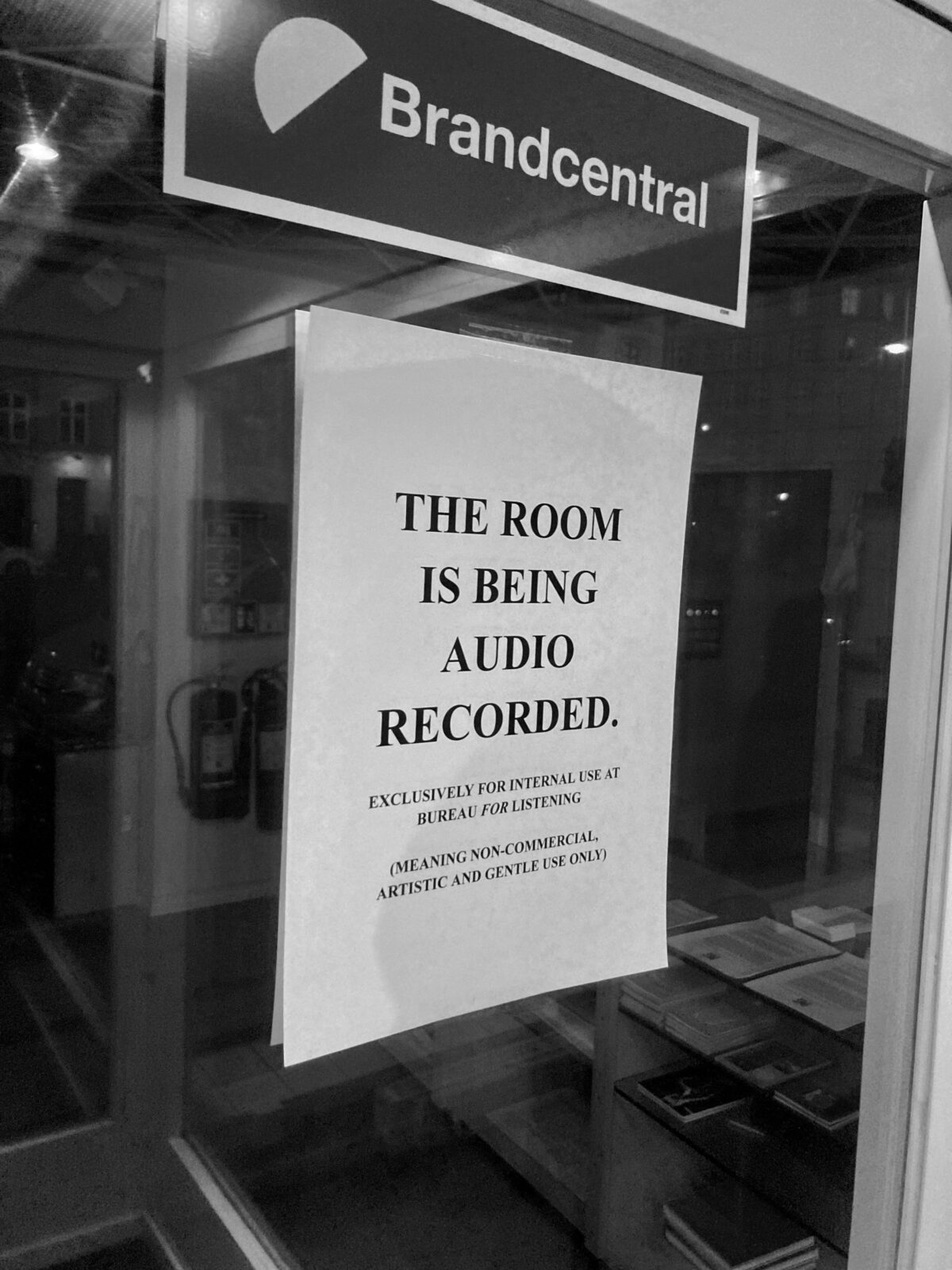
Notes for a “lost” conversation with artist Claudia Lomoschitz.
A Foreword (for Listening Event I):
Dearest you
In the spirit of convening in this space together and as a way to connect with you, we welcome and greet you with gratitude for making it here.
Thank you.
You are encouraged to bear witness to the diverse experiences and ways of knowing a group of people, no matter how small, always carries with them into equally already complex spaces of histories.
You are always already that witness – of the said as well as of the unsaid, the known as well as the unknown.
We invite you to engage, support, and doubt what is conditioning your presence, your listening, and ways of living.
We invite you to consider how your listening is a performative act. How we might already be performing together, now, here in this room.
Have fun, be brave, and thank you for being here.
Stay, be present, and join in slowly
- at your own pace and in your own time.
Yours sincerely
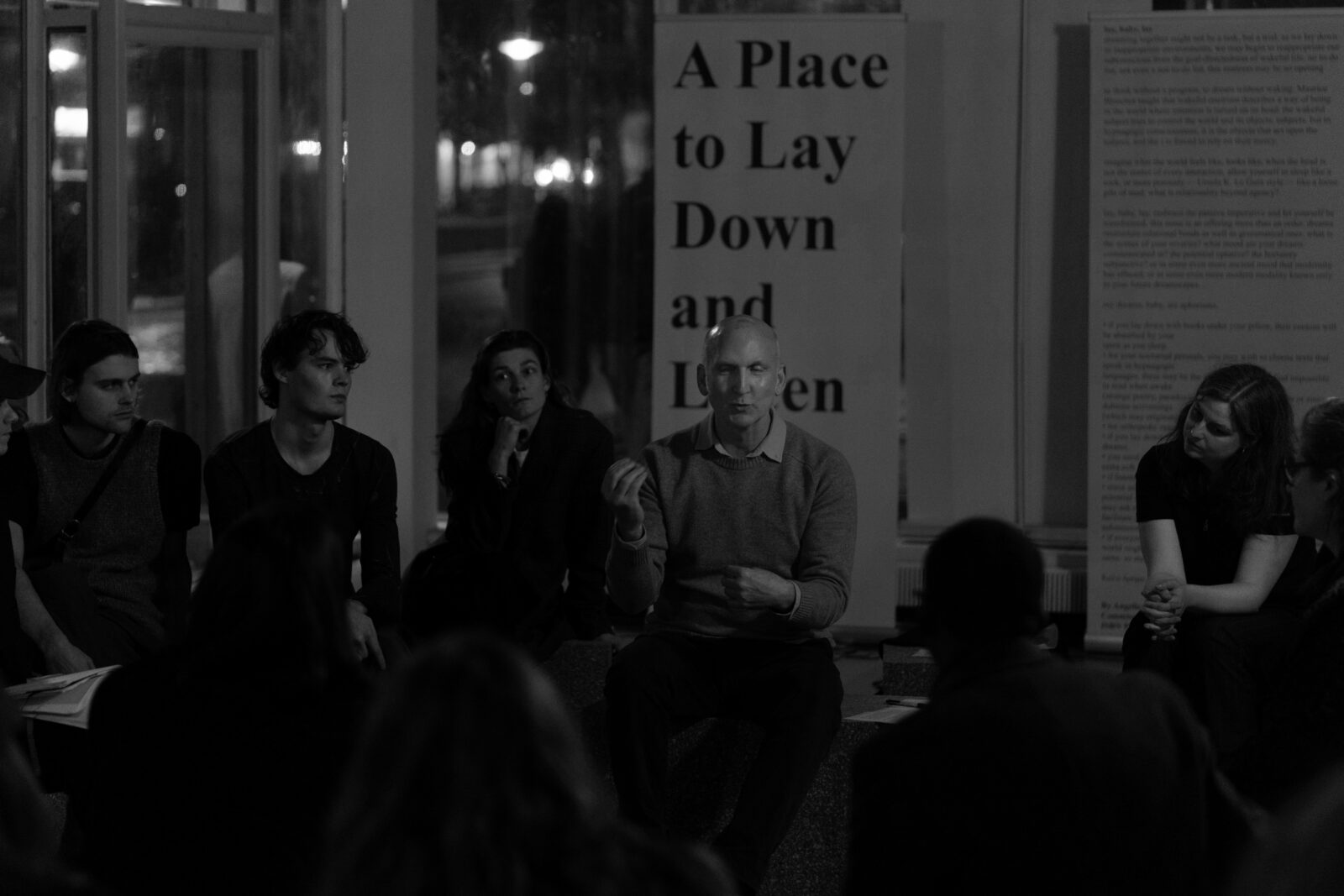
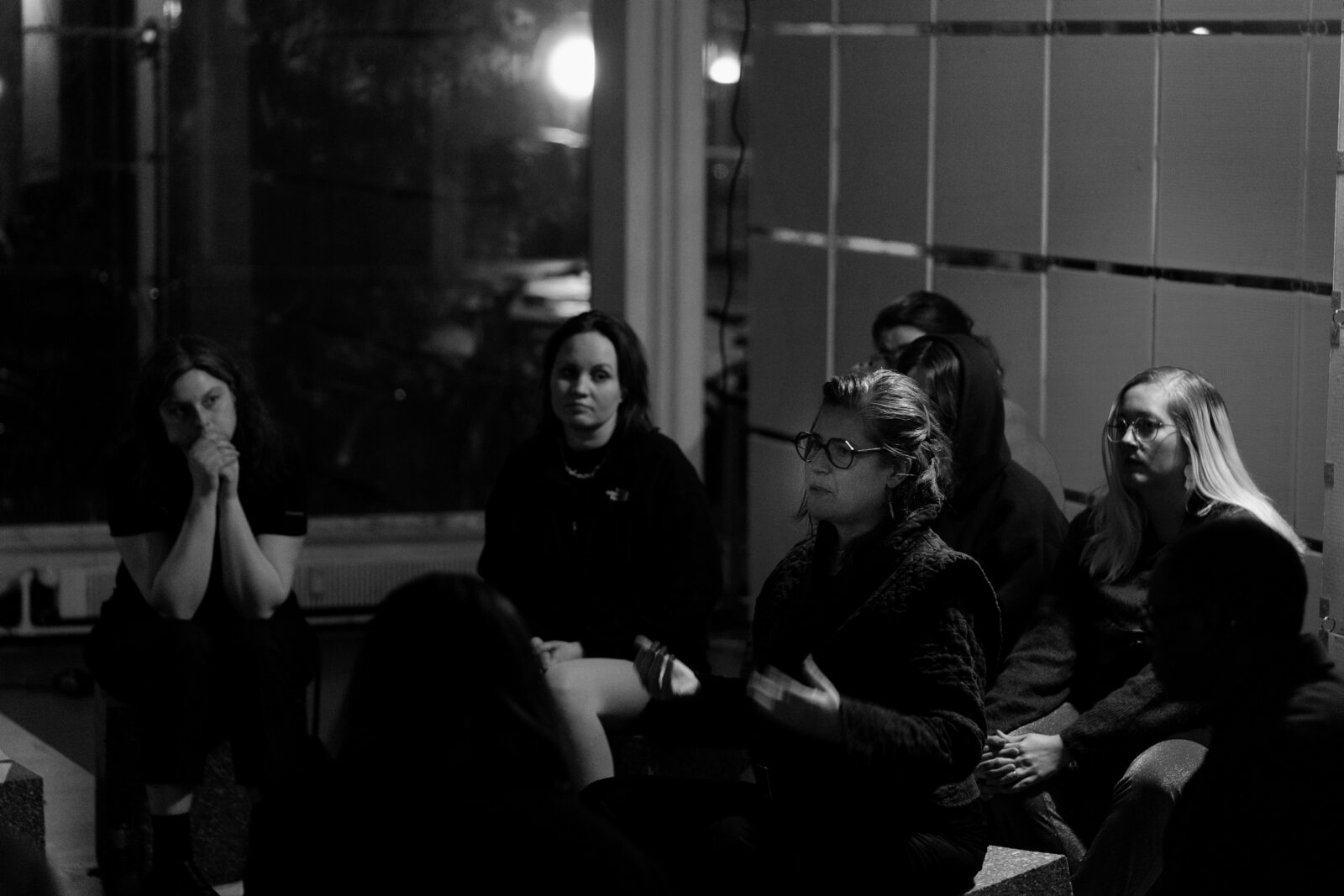
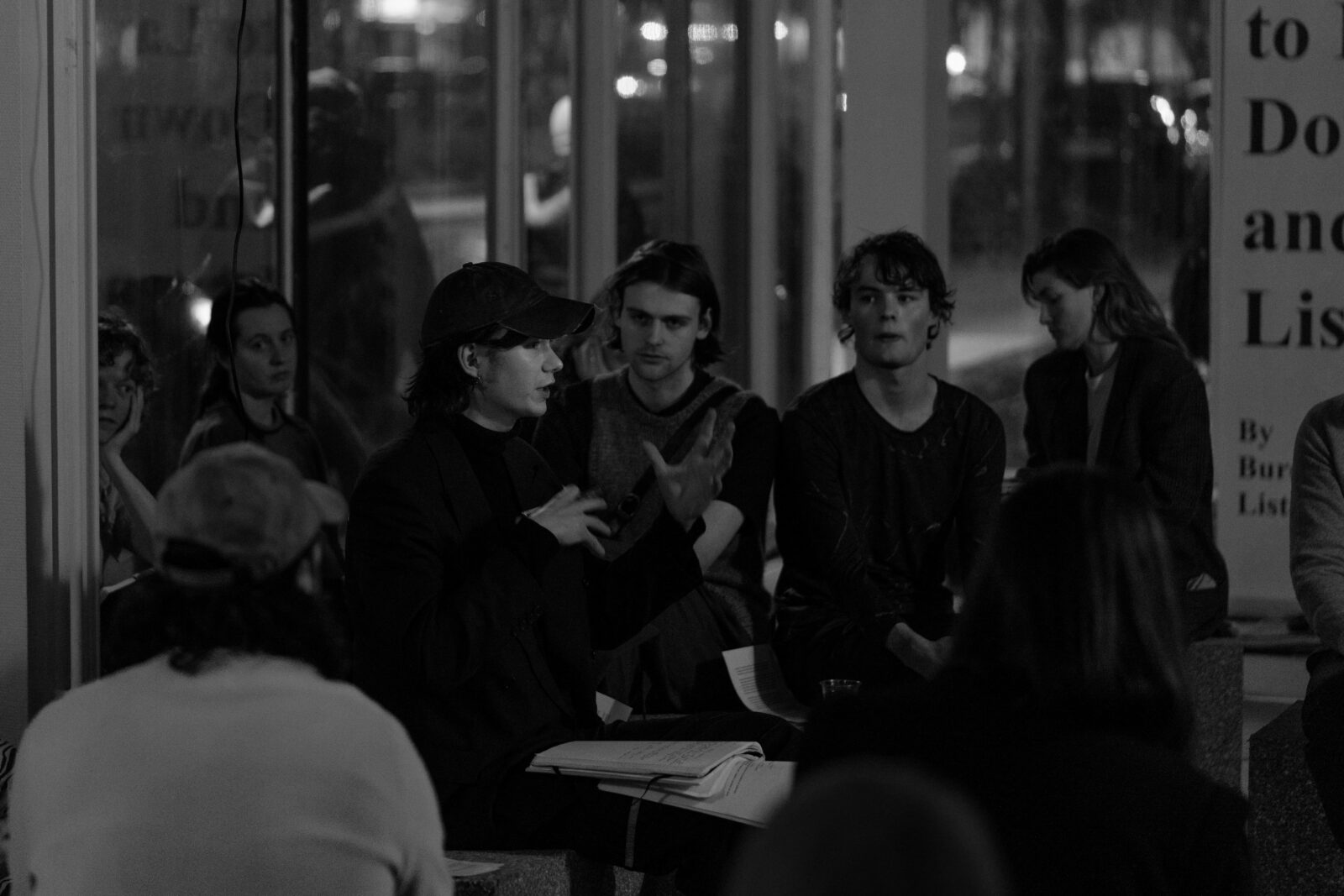
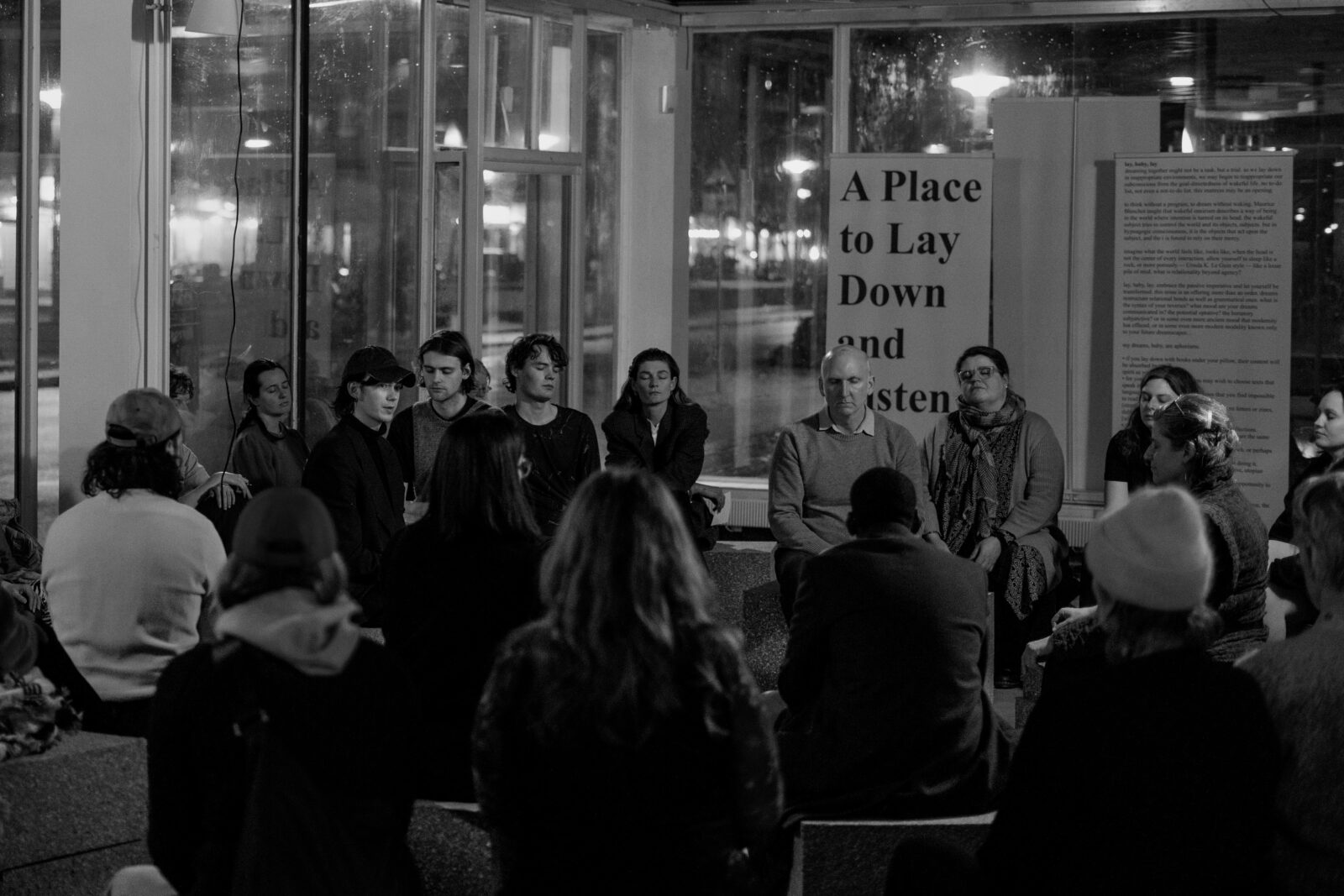
Listening Exercise for Listening Event 1:
[To be read to a group]
[Perform for the first time at Listening Event I, Friday the 26th January 2024, as an opening and attuning exercise before any further context and introduction]
Reader:
Start with closing your eyes.
Breathe, following your own need.
Relax your body.
Find comfort in sitting together, as a group, with eyes closed, breathing.
Listen to the outside of this room.
Try to remember the sounds from your traveling to this place.
What sounds did you leave outside upon entering here?
What sounds from the outside did you bring with you inside?
Listen to this room – later when you will be leaving it, what sounds of this room will you then remember from this specific room?
Listen to the other people, who you are in here with – who are they?
Listen to their breathing, if possible.
If possible follow someone else’s breathing.
In your own time, simply open your eyes and orientate yourself.
LISTEN WITH FRICTION – TO FRICTION – AS FRICTION
Questions and invitations for Listening written and called out into the room at Listening Event I – while collectively facing the facade windows rather than each other.
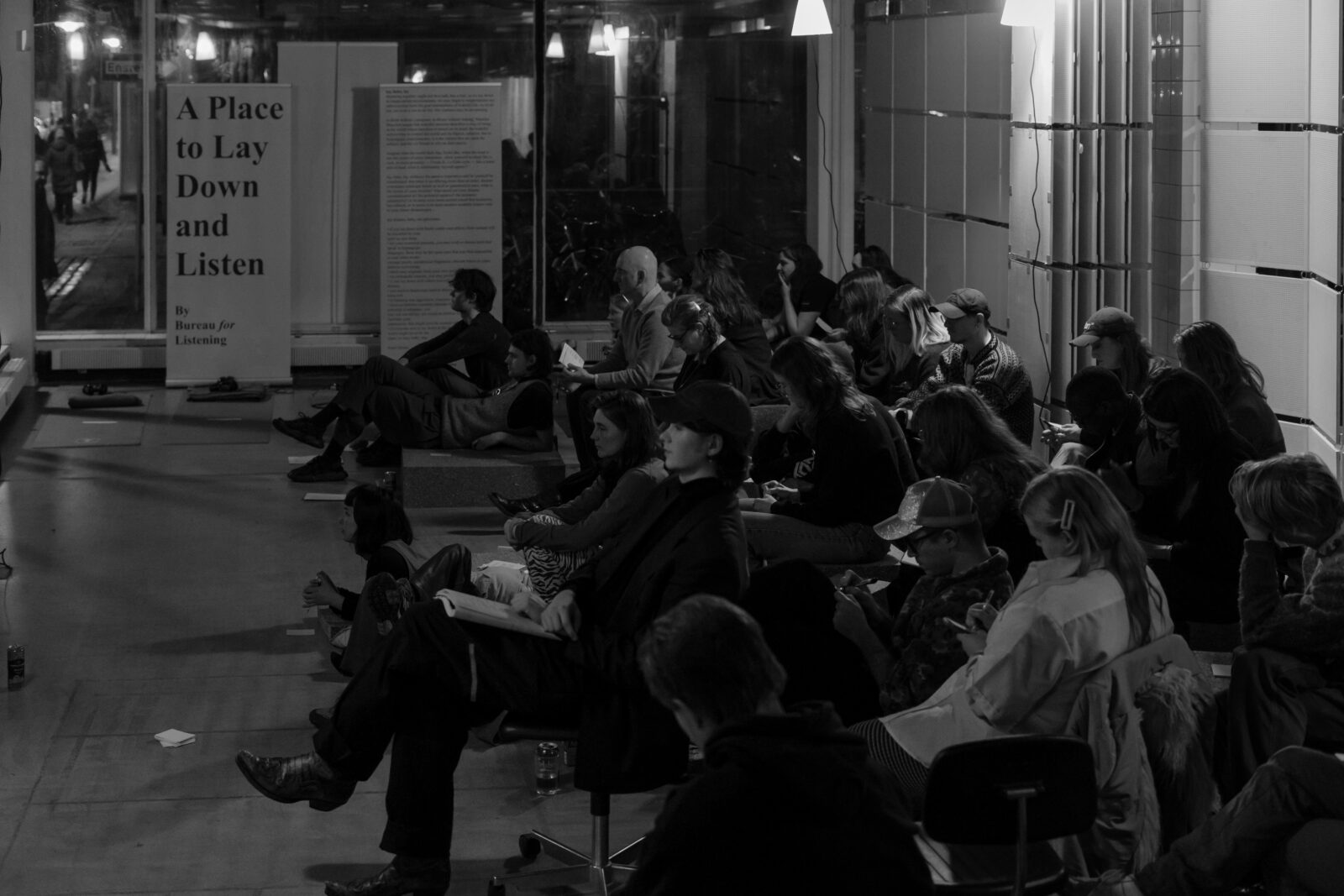
Transcription of the recording from the event:
–
Do you listen to the suffering of another?
Is listening, the act of listening, dependent on sound?
What am I not hearing?
What is the relation between trust and listening?
When are we not listening? When do we have the courage to own that?
How much listening is violence?
What does it actually mean to listen… listen… listen?
How can I share how listening feels on my skin?
[laughter]
Can I listen to the thoughts of the people passing by on the other side of the glass?
As I feel that someone is looking at me, In what way can I feel that someone is listening to me?
Do you feel more comfortable being listened to when others don’t perform active listening?
Maybe no one ever really can listen. They can’t because their brain is noisy because they are wondering when they get to talk and what to say. And maybe that’s okay. We can still try.
Who do I listen to? Who and what do I give my attention to?
Is this a place to lay down and listen?
Listen up, listen down.
Non-active listening: practice non-active listening. Get into that headspace. Not passive listening. Soft, non-performativ, surrendering. Listen without nodding or talking. Without looking the speaker in the eyes. Without even facing them. Just listen.
Who said that?
Do you listen with an open heart?
Listen to the silence.
What is silence? What does silence sound like? Is it ever silent? Is silence a privilege?
When you deep dive, you have to release air from your ears. Is that a kind of listening?
Can you recognise the external sound of your voice?
How do you listen to political struggle?
Listen carefully, I will only say this once.
Listen to your heart, then you know what you want to do.
Can you listen without acting? Is listening a form of acting?
Can you only listen when you are well rested, when you have food, water, and the room is at the right temperature.
Do you even listen?
Do you listen while dreaming?
Are you ready to listen? And when are you ready to listen?
How do you listen to spirits?
Does the listening in the city also cycle?
How do you listen to a bicycle?
When did you feel forced to listen when you didn’t want to hear?
Sometimes it takes listening to a song 15 times before you really hear what they’re singing about.
Sounds like listening to metal.
Are the words listening [inaudible].
You are invited to refuse being listened to. You are invited to refuse offering your listening.
How is listening when I really give in to not producing?
When you have talked too much, your mouth gets dry. What happens when you have listened too much?
You don’t owe anyone your listening.
How can I start listening to the automatic thoughts in my head?
I love to listen to the wind.
Is the wind listening to us?
When are you listening with and when are you listening to?
In what ways do we listen to others differently than we listen to ourselves?
Listen to your body.
How do you listen to the pauses?
To listen in, but to hear out.
Can you listen to the future?
Would you hear it if someone, something, or somewhere was calling for you?
Have you listened with the forces?
[Longer pause]
[Laughing]
Who was the listening group of the last month?
Who is the listening group?
Can a forest listen to me?
Can you listen to me?
[laughter]
Can you listen through touch?
I listen better when my hands are up.
Do you listen with your hands?
Do you listen with your eyes?
Do you listen with your sense of smell?
Do you listen with your ears?
Yeah.
[Laughter]
Maybe not.
Do you listen with your ears if you’re deaf?
How do you listen if you don’t have ears?
Are we done listening?
Do you listen with your face?
Is it a resolution that we are hearing?
Do you connect through listening?
What is listening? What is [nonsense word/sound]?
Would it feel so good to crack your joints if it doesn’t make a sound?
Do we listen to everything subconsciously?
Even when we don’t want to?
Could a listening station be used for non -military purposes?
How many years would it take to listen to all of the surveillance recordings made in the world?
Force losing your bearings in a physical historical archive and start listening to the collections around you.
Are the aliens recording our listening?
Do we need a modern day confession booth just for normal problems and not religious?
How does the world sound for the baby inside its mother’s.. oh.. stomach?
Can listening save lives?
—
Transcribed from the hand-written cards to the best of ability. Apologizing for any errors.
Which ones was not read out into the room?
How much listening is violence?
Try to listen to the thoughts and emotions of the people passing by on the other side of the window. (Bedded resonances of their being and journey in the world?)
If you can not see with your eyes, how can you see a foggy landscape with your ears?
Would you hear it if someone/something/somewhere was calling for you?
Do you listen with your hands?
How do you listen to the pauses?
How do you listen with the pauses?
Listen to your body / listen with your breath.
Listen with my breath.
Can you listen through touch?
Who is the listener/the listened?
When I choose to listen, what am I choosing not to listen to? Is listening a choice? Is it attention?
Can listening be a tool for documentation?
Can we/you listen to the falling and rising pressure over the atlantic ocean?
Do people change themselves now when they know the world is listening?
What does it mean to listen? How much is it following the other’s word and concepts carefully and bringing them in and how much does listening allow you to be present within you (perhaps a bit distant to what others are saying)?
Score: listen to your listening – what does your mind go through when you’re listening to someone? Try to notice what happens to the words/noise that you hear. Where do they enter? How do they exit? Do you care for it (the words/noise)? How?
When is silence becoming too loud?
Are you understanding what you’re listening to if you’re not connecting to what you’re hearing?
Listen with an open heart.
[From this side of the glass // They see us seeing them // They sound muted and deep // She sees me smile // I hear her laugh]
Does listening to you mean suspending listening to myself?
When are we not listening – and when do we have the courage to own it?
Is my listening conditional?
How do I listen to make myself heard?
How to pick up the unsound?
Invitation to listen: Force losing your bearings in a physical historical archive and start listening to the collections around you.
What comes after listening?
Do I care if I am well listened to? Do I need to just open up?
Core of listening, non, emptiness of listening and hell of not hearing. Landscapes, situations and pressure of surroundings. Can negative listening be haven in close environments in domestic listening? The pain of not being asked to continue the story? How is listening essential to close relationships?
Are you ready to listen? And when are you ready to listen?
Where is the listening going to, when it has been listened?
I think that the limbs of your body each have a soul, so yes, you can listen with the soul of your feets. To listen with your body.
Why are we so accustomed to the external sound of our voice? Can you recognize the external sound of your voice?
What I am not hearing?
How do you listen to the suffering of another?
How do you listen to political conflict?
What is listening? What is achlpphhh?
Listening loud.
What is the relation between trust and listening?
Can we listen to the future?
Do we talk to be listened to or for validation?
What are you listening for?
In what ways do we listen to others differently than we listen to ourselves?
Non-active listening: practice non-active listening. Get into that headspace. Not passive listening. Soft, non-performativ, surrendering. Listen without nodding or talking. Without looking the speaker in the eyes. Without even facing them. Just listen.
Do you feel more comfortable being listened to, when others don’t perform (active) listening? When you don’t expect validation and affirmation merely talk till you stop and trust that you’ve been listened to.
Can I listen with my deep breath? Can I listen in different languages? Can I listen with my arms and eyes, with my towel and hair? Can I do something else despite of listening if I am drinking water? Is taking photos listening?
In how many languages can we hear each other?
Is it easy for you to feel a connection with the person you listen to? If yes, how would you describe this feeling of connection?
Is it possible to voice an experience you’ve listened to as something (sound, language, narrative) that someone else can listen to?
How can we listen to what we cannot grasp? Or voice as well –
Are acts of listening restricted by experience, identification, recognition?
Do you even listen?
How can I share how listening feels on my skin?
Do I listen between when I am quiet?
When you have talked too much, your mouth gets dry – what happens when you have listened too much?
Why am I so ashamed of the noises my stomach and guts make when I am hungry?
Can you only listen when you are well-rested, have had food, water, and the room is the right temperature?
When do I get suffocated by too much listening?
When can listening be harmful? (i-e I listen to my love, but should not) (i-e I listen to my violence but I shouldn’t)
Does one have to be silent to listen?
Is listening agreeing?
Is listening an obligation to action?
How do you signal that you don’t want to listen?
What if listening was your job? (What would it be? Would you be good at it?)
I invite you to listen before thinking. Can you listen too much, too hard? How can I stop listening to the automatic thoughts in my head?